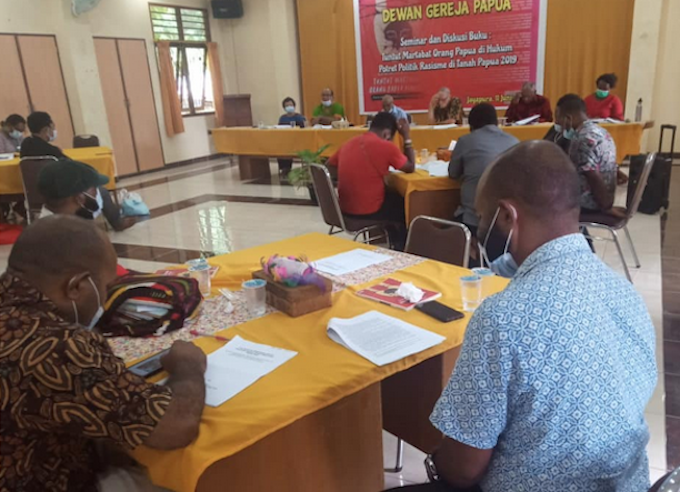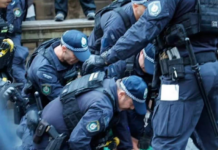By Benny Mawel in Jayapura
The United Liberation Movement for West Papua (ULMWP) believes that the Indonesian government has nine motives behind the branding of National Liberation Army of West Papua as terrorists.
Executive director Markus Haluk of ULMWP said this during a seminar and book discussion about Demanding Dignity, Papuans Are Punished in Jayapura on Friday.
He said it was believed that one of the reasons the Indonesian government labels armed groups as terrorists was to stem and limit ULMWP diplomacy in various Melanesian countries, the Pacific, and in other countries worldwide.
- READ MORE: West Papua and other critical issues – why is NZ media glossing over them? – David Robie
- Other West Papua human rights reports
“We’ve been reading that since a few months ago,” said Haluk.
He said the Indonesian the government continued to strive to increase its influence in a number of international forums attended by the ULMWP delegation.
In these various forums, the Indonesian delegation strived to minimise the role of the Papuan delegation.
“They started with the issue [that] Papua could not afford to pay the dues (For the Melanesian Spearhead Group). Papua has already handled [the various efforts].
‘Terrorism’ issue raised again
“[Then] Indonesia raised the issue of terrorism again,” said Haluk, who delivered a presentation entitled “Revealing the government’s motivation with the terrorist label to Papua”.
According to him, the terrorist brand was also an attempt to silence and isolate the movement of indigenous Papuans.
As a result, whatever the activities of the indigenous Papuans are they would come to the attention of the Indonesian government because they were associated with the terrorist label.
“The terrorist label is a way of isolating the Papuan issue and silencing Papuans’ freedom of expression,” Haluk said.
Haluk said that the effort to silence the expressions of indigenous Papuans was part of the Indonesian government’s efforts to pass a revision of Law No. 21/2001 on Papua’s Special Autonomy.
This happened because the Papuan people continued to reject the Indonesian government’s efforts to extend the Special Autonomy Law, including by holding demonstrations and collecting the signatures of the Papuan People’s Petition (PRP).
“Clearly, there was the arrest of Victor Yeimo, spokesman for the [international West Papua National Committee] and the PRP. There have been expulsions of students from Cenderawasih University student dormitories and flats, internet access has been cut off,” Haluk said.
Easier for Indonesian weapons
“Haluk suspects that the terrorist label for armed groups (West Papua National Liberation Army) is an effort to smooth the way for procurement of weapons and combat equipment for the TNI/POLRI (Indonesia National Army/Indonesia National Police).
The designation of armed groups in Papua as terrorists would also increase the opportunity for members of the TNI/POLRI to participate in various cooperation exercises in dealing with terrorists with other countries and increase the opportunity to obtain funds for handling terrorists from the European Union, United States, Australia and New Zealand.
Haluk said that the terrorist label would also be a means of intimidation against executive and legislative officials in Papua.
In addition, the terrorist label would facilitate the state’s efforts to secure investment and the interests of national and international investors.
“Indonesian political elites play a big role in investment interests, for example in forest concession rights, selling alcoholic beverages, and mining,” he said.
The labeling of terrorists could even be used as a stage for politicians to contest the general election in Indonesia.
“[It could be] a political stage for the sake of the legislative and presidential elections in 2024, as well as for the interests of the local Papuan political stage, for example, seizing the leadership of the Democratic Party in Papua, or the 2023 Papuan gubernatorial election,” Haluk said.
‘Branding’ not new
The president of the Fellowship of West Papua Baptist Churches, Reverend Dr Socratez Sofyan Yoman, who is also a member of the Papuan Church Council, said that the label of terrorists was not new.
“The label appeared in the 1960s. [There is a label] Free Papua Organisation, separatist, KKB, KKBS, GPK, [then now] we are facing the terrorist label. It’s a repetition of all those [labels],” he said.
According to Yoman, the various labels were created to smooth over or legalise the actions of the state apparatus to commit violence against Papuans.
“Papuans continue to be tortured and killed in their own country,” said Reverend Yoman.
This article from Tabloid Jubi has been translated by a Pacific Media Centre correspondent and is republished with permission.











































